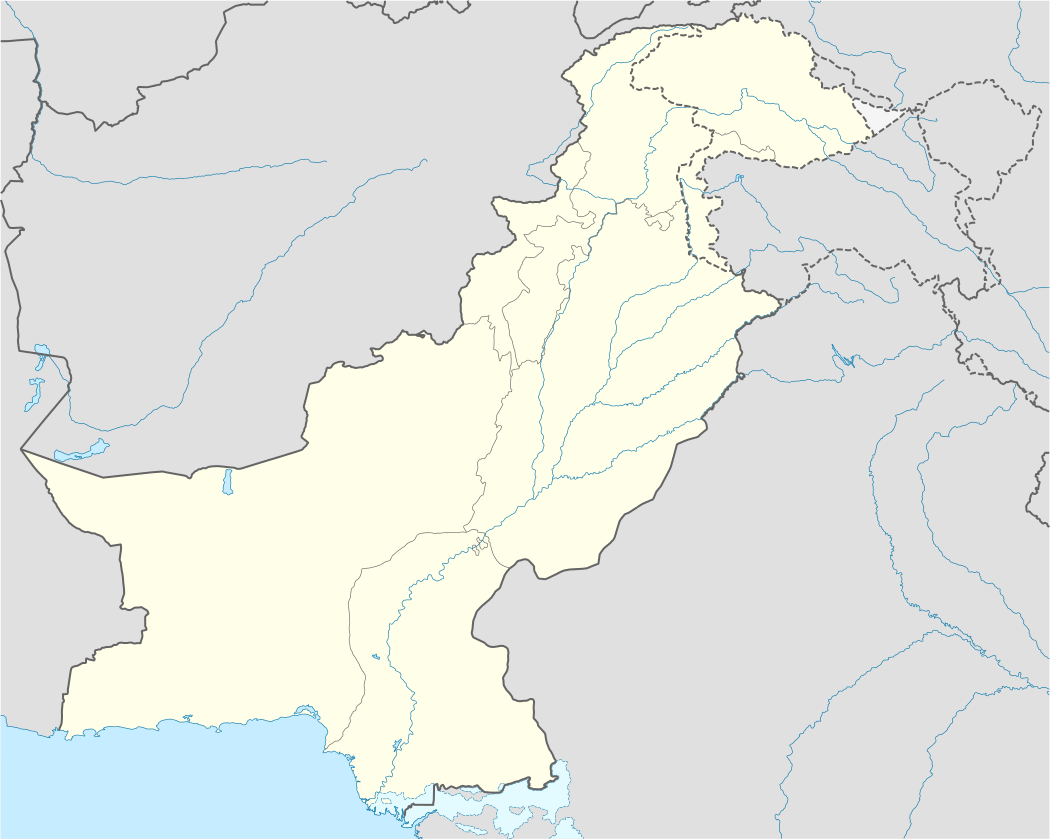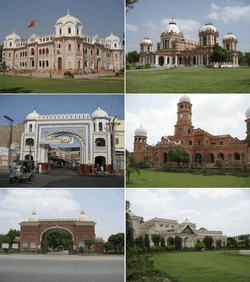Bahawalpur
| Bahawalpur بہاولپور | |
|---|---|
| City | |
|
Clockwise from top:
Darbar Mahal, a former palace of the Nawabs of Bahawalpur, Noor Mahal, Farid Gate, Sadiq Dane High School, Entrance of Dring Stadium and Bahawal Victoria Hospital. | |
 Bahawalpur Location in Pakistan | |
| Coordinates: 29°23′44″N 71°41′1″E / 29.39556°N 71.68361°ECoordinates: 29°23′44″N 71°41′1″E / 29.39556°N 71.68361°E | |
| Country | Pakistan |
| Region | Punjab |
| District | Bahawalpur |
| Tehsil | Bahawalpur |
| Union councils | 36 |
| Area | |
| • Total | 237.2 km2 (91.6 sq mi) |
| Elevation | 461 m (1,512 ft) |
| Population (2014)[1] | |
| • Total | 1,052,000 |
| • Density | 4,400/km2 (11,000/sq mi) |
| Bahawalpur Urban agglomeration | |
| Time zone | PKT (UTC+5) |
| Postal code type | 63100 |
| Area code(s) | 062 |
| Website | www.bahawalpur.gov.pk/ |
| Bahawalpur Government Website | |
Bahawalpur (Punjabi, Urdu: بہاولپور), is a city in Punjab, Pakistan. The city used to be the capital of the Bahawalpur princely state, now the Bahawalpur District. It is the 13th most populous metropolitan area of Pakistan.[2]
History
The princely state of Bahawalpur was founded in 1802 by Nawab Mohammad Bahawal Khan II after the break-up of the Durrani Empire. The city is over 4.51 kilometres long. Nawab Mohammad Bahawal Khan III signed a treaty with the British on 22 February 1833, guaranteeing the independence of the Nawab. The state acceded to Pakistan on 7 October 1947 when Nawab Sadiq Muhammad Khan Abbasi V Bahadur[3] decided to join Pakistan fifty days after independence.[4]
Economy

The main crops for which Bahawalpur is recognised are cotton, sugarcane, wheat, sunflower seeds, rape/mustard seed and rice. Bahawalpur mangoes, citrus, dates and guavas are some of the fruits exported out of the country. Vegetables include onions, tomatoes, cauliflower, potatoes and carrots. Being an expanding industrial city, the government has revolutionised and libertised various markets allowing the caustic soda, cotton ginning and pressing, flour mills, fruit juices, general engineering, iron and steel re-rolling mills, looms, oil mills, poultry feed, sugar, textile spinning, textile weaving, vegetable ghee and cooking oil industries to flourish.[5]

Solar Park
Near the city the Quaid-e-Azam Solar Park is being erected, a photovoltaic power station named after Quaid-e-Azam, the founder of Pakistan. It is the first ever utility scale solar power plant in the country and is to have a capacity of 1,000 MW when finished in 2016. A first phase was brought online in April 2015 and opened by Pakistan’s Prime Minister Nawaz Sharif and Chinese President, Xi Jinping.[6][7]
Sports
Bahawal Stadium is the multipurpose stadium, home to Bahawalpur Stags. It hosted a sole international match, a test match between Pakistan and India in 1955.
Deobandi Islamism
Deobandi Islamism got established in the Bahawalpur area during colonial times in an effort to counter the strong Sufi influence in the area. After the Partition, a number of Deobandi institutions from Jalandhar and Ludhiana areas relocated to Multan and Bahawalpur in South Punjab. In recent years, there has been a proliferation of Deobandi religoius institutions and considerable recruitment for jihad in Afghanistan and Kashmir.[8] There are at least 500 –1000 madrassas in Bahawalpur belonging to Deobandi and Ahl-e-Hadith orientations, many of which teach a violent version of Islam to children.[9]

Maulana Masood Azhar, founder of Jaish-e-Mohammad, was born in Bahawalpur in 1968. He established the headquarters of JeM in Bahawalpur with a 6.5 acre walled complex that serves as a training facility and a madrasa in the centre of the city.[9]
See also
- Bahawalpur Museum
- Bahawalpur Zoo
- Derawar Fort
- Kakazai
- Noor Mahal
- List of people from Bahawalpur
- List of educational institutions in Bahawalpur
References
- ↑ http://www.demographia.com/db-worldua.pdf
- ↑ http://www.pbs.gov.pk/sites/default/files//tables/POPULATION%20SIZE%20AND%20GROWTH%20OF%20MAJOR%20CITIES.pdf
- ↑ Christopher Buyers, Royal Ark website. "Bahawalpur: The Abbasi Dynasty". Archived from the original on 15 November 2007. Retrieved 2007-10-13.
- ↑ Remembering Bahawalpur province Tribune Pakistan - February 6, 2012
- ↑ "Archived copy". Archived from the original on 3 September 2010. Retrieved 2009-09-17.
- ↑ "CM defends power schemes". The Nation. 12 September 2015. Retrieved 8 October 2015.
- ↑ "Pakistan Solar Park Plugs In 100 MW To Grid". Cleantechnica. 19 June 2015. Retrieved 27 October 2015.
- ↑ Talbot 2015, p. 6.
- 1 2 Shah, Saeed (13 September 2009). "Terror group builds big base under Pakistani officials' noses". McClatchy newspapers. Retrieved 2 October 2016.
Bibliography
- Moj, Muhammad (2015), The Deoband Madrassah Movement: Countercultural Trends and Tendencies, Anthem Press, ISBN 978-1-78308-389-3
- Talbot, Ian (2015), "Introduction", in Roger D. Long; Gurharpal Singh; Yunas Samad; Ian Talbot, State and Nation-Building in Pakistan: Beyond Islam and Security, Routledge, pp. 1–, ISBN 978-1-317-44820-4
- Zahab, Mariam Abou; Roy, Olivier (2004) [first published in French in 2002]. Islamist Networks: The Afghan-Pakistan Connection. Translated by King, John. C. Hurst & Co. Publishers. ISBN 978-1-85065-704-0.
External links
-
 Bahawalpur travel guide from Wikivoyage
Bahawalpur travel guide from Wikivoyage - Bahawalpur at DMOZ

